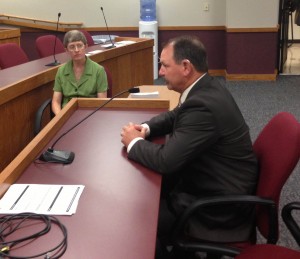JEFFERSON CITY, Mo. — The Bipartisan Investigative Committee on Privacy Protection that was called to examine whether any administrative rules or laws were violated in the scanning of thousands of personal documents related to new conceal carry permits and drivers licenses is approaching the end of its investigation after another day of witness testimony in the Capitol.
Chairman, Rep. Stanley Cox, R-Sedalia, said he was hoping to have a report prepared for House Speaker Tim Jones, R-Eureka, by the beginning of veto session next month, but acknowledged that would depend largely on how long the approval of the report would take.

Cox said he would likely be recommending some statutory changes to prevent further implementation of security measures utilized by the DMV that mirror measures called for in the federal REAL ID Act. Missouri banned participation in the REAL ID Act in 2009 through a state law signed by Gov. Jay Nixon.
Members of the committee contend the Department of Revenue continued to implement security measures associated with REAL ID but denied the intention was to comply in order to continue receiving federal grants for new Department of Motor Vehicle procedures and equipment while not violating state law.
Cox and his fellow committee members believe several witnesses minced words about whether the law was violated or not.
“The law was, in actuality, violated,” Cox told The Missouri Times. “The Department was perusing almost every single called for in the REAL ID Act, but simply stating that they weren’t trying to comply with that law in an attempt to skirt the law and the will of the people and that is wrong.”
Cox said the committee would likely have to statutorily ban specific security practices and equipment in order to half the Department’s continued use of measures that mirror REAL ID requirements.
Much of the testimony today focused on the Missouri State Highway Patrol and the DOR handling of a massive license fraud case in St. Joseph, Mo., where a local license fee office distributed more than 3,500 fraudulent IDs in a $5 million scam.
Because it was the DOR and MSHP that originally came under scrutiny for scanning, maintaining and then releasing to the federal government the information on more than 160,000 CCW permit holders, Cox said the missteps in the St. Joseph investigation were shedding light onto departmental procedures that his committee would likely seek to fix.
The Committee will meet again at 9 a.m. Tuesday and the process of writing the report will begin soon, Cox said. Should it be ready in time, the Committee will vote to approve or reject the report just before veto session.
Collin Reischman was the Managing Editor for The Missouri Times, and a graduate of Webster University with a Bachelor of Arts in Journalism.



